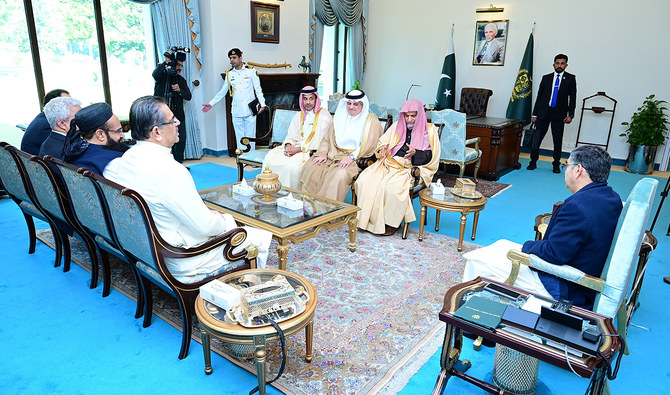ISLAMABAD: Imam-e-Kaaba Sheikh Saleh bin Humaid separately met Caretaker Prime Minister Anwaar-ul-Haq Kakar and Army Chief General Asim Munir on Friday, said official statements released by the PM Office and the military’s media wing ISPR, adding that the situation in Gaza, among other issues, was discussed in the two interactions.
The meetings came during the four-day visit of Sheikh Saleh, an adviser to Saudi Arabia’s Royal Court, to Islamabad, which is aimed at enhancing brotherly ties between Pakistan and the Kingdom.
The Pakistan premier said the Custodian of the Two Holy Mosques and the Crown Prince gave a clear message to the world of the Muslim Ummah’s unconditional support for the Palestinians by holding an Islamic summit on the situation in Gaza.
“The Prime Minister strongly condemned the ongoing atrocities on Palestinians and massacre of children in Gaza,” PM Kakar’s office said in a statement.
“Teaching the young generation about our glorious past through documentaries on Islamic history and culture is an important need of the hour to combat Islamophobia.”
PM Kakar said these documentaries on Islamic teachings, history and tradition should be broadcast in different languages to help convey the correct context of Islam to people in every corner of the world.
During the meeting, the prime minister expressed his gratitude to the Saudi leadership for the development of education and health sectors in Pakistan, and for the welfare of Pakistani workforce in Saudi Arabia.
Sheikh Saleh appreciated the important role of Pakistani manpower in the development and prosperity of Saudi Arabia, according to the statement.
“The Imam Kaaba described the long-standing brotherly relations between Pakistan and Saudi Arabia as ideal,” it read.
He thanked Pakistan for the excellent hospitality during his visit, according to the statement.
Later, Sheikh Saleh met General Munir at the army headquarters in Rawalpindi. Both sides expressed concern over the situation in Gaza.
“Pakistan and the Kingdom of Saudi Arabia have strong strategic relations based on exemplary historic religious and cultural ties and unique reverence of Kingdom of Saudi Arabia in the hearts of the Pakistanis apart from the unanimity of views among the two brotherly countries,” the ISPR statement quoted the army chief as saying.

Pakistan's Army Chief General Asim Munir (right) meets Imam-e-Kaaba Sheikh Saleh bin Humaid (second left) in Rawalpindi, Pakistan on November 24, 2023. (Pakistan Army)
Prior to their meeting, Sheikh Saleh led Friday prayers at the iconic Faisal Mosque in the Pakistani capital.


















